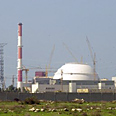
Iranian nuclear plant in Bushehr (Archives)
צילום: איי פי
Retired general: US strike on Iran 'feasible and credible'
Charles Wald, former deputy commander of US forces in Europe says in Wall Street Journal op-ed policy makers must prepare for 'Plan B' should diplomacy, economic pressure fail
A devastating US military strike against Iran's nuclear and military facilities "is a technically feasible and credible option," a retired general asserted in an article published on Friday.
Retired air force general Charles Wald, a former deputy commander of US forces in Europe, said US policy makers must prepare for a "Plan B," including the military's role, should diplomacy fail.
"A peaceful resolution of the threat posed by Iran's nuclear ambitions would certainly be the best possible outcome," Wald wrote in an opinion piece in the Wall Street Journal.
"But should diplomacy and economic pressure fail, a US military strike against Iran is a technically feasible and credible option," he said.
Wald's views were in striking contrast with those of the Pentagon's top civilian and military leaders, who have warned repeatedly that military action against Iran would be highly destabilizing.
'Iran would retain nuclear know how'
President Barack Obama, meanwhile, has sought to engage Iran diplomatically, but prospects of a breakthrough have been clouded by political turmoil in Iran over President Mahmoud Ahmedinejad's disputed re-election.
"Many policy makers and journalists dismiss the military option on the basis of a false sense of futility," Wald wrote.
"They assume that the US military is already overstretched, that we lack adequate intelligence about the location of covert nuclear sites, and that known sites are too heavily fortified," he said.
"Such assumptions are false," he said.
Wald argued that serious military preparations for a strike could in themselves help persuade Iran to end its nuclear defiance "without firing a single shot."
Pressure could be applied by deploying additional aircraft carrier battle groups and minesweepers to waters off Iran and conducting military exercises with allies, he said.
If that failed, he said, the US Navy could blockade Iran's Gulf ports, cutting off gasoline imports that constitute a third the country's domestic consumption.
"Should these measures not compel Tehran to reverse course on its nuclear program, and only after all other diplomatic avenues and economic pressures have been exhausted, the US military is capable of launching a devastating attack on Iranian nuclear and military facilities," he wrote.
Wald acknowledged there were "huge risks to military action," including that Iranians would rally around "an unstable and oppressive regime" and that reprisals and regional unrest would follow.
"Furthermore, while a successful bombing campaign would set back Iranian nuclear development, Iran would undoubtedly retain its nuclear know how," he said.
"But the risks of military action must be weighed against those of doing nothing," he said.










